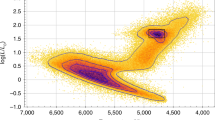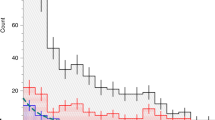Abstract
The observed abundance of lithium in population I stars (young stars)1 seems to have been stable during the past 5 × 109 yr (ref. 2). This stability has been used previously1,3 to estimate the abundance of lithium at the time of formation of the Galaxy and at pre-galactic times1,3. But because the basis for this estimate was not completely satisfactory, we have made new observations, aiming at a better determination of the lithium abundance at the time of formation of the Galaxy. The newly observed stars are extreme population II dwarfs (very old, very metal-poor stars). Their lithium abundance turned out to be significantly lower than the abundance in population I stars. If attributed to the big bang, this lithium abundance suggests a rather low baryonic density of the Universe, which in turn favours, under some assumptions, an open Universe3. Finally, we suggest that the good agreement between the abundance of 7Li and the deuterium 2H abundance3 supports the standard model of the big bang.
This is a preview of subscription content, access via your institution
Access options
Subscribe to this journal
Receive 51 print issues and online access
$199.00 per year
only $3.90 per issue
Buy this article
- Purchase on Springer Link
- Instant access to full article PDF
Prices may be subject to local taxes which are calculated during checkout
Similar content being viewed by others
References
Boesgaard, A. M. Publ. astr. Soc. Pacif. 88, 353–366 (1976).
Audouze, J. & Tinsley, B. M. Astrophys. J. 192, 487–500 (1974).
Austin, S. M. & King, C. H. Nature 269, 782 (1977).
Cayrel, R. J. Opt. 11, 5–6 (1980).
Spite, M. & Spite, F. C.r. hebd. Séanc. Acad. Sci., Paris 293, 299–301 (1981).
Spite, M. & Spite, F. Astr. Astrophys. (submitted).
Boesgaard, A. M. in Highlights of Astronomy Vol. 4, Part II (ed. Müller, E. A.) 209–216 (Reidel, Dordrecht, 1977).
Duncan, D. K. Astrophys. J. 248, 651–669 (1981).
Sneden Ch Lambert, D. L., Tomkin, J. & Peterson, R. C. Astrophys. J. 222, 585–594 (1978).
McCrea, W. H. Mon. Not. R. astr. Soc. 113, 162–179 (1953).
Talbot, R. J. Jr & Newman, M. J. Astrophys. J. Suppl. Ser. 34, 295–308 (1977).
Bodenheimer, P. Astrophys. J. 142, 451–461 (1965).
Vauclair, S., Vauclair, G., Schatzman, E. & Michaud, G. Astrophys. J. 223, 567–582 (1978).
Wagoner, R. V. Astrophys. J. 179, 343–360 (1973).
Meneguzzi, M., Audouze, J. & Reeves, H. Astr. Astrophys. 15, 337–359 (1971).
Starrfield, S., Truran, J. W., Sparks, W. M. & Arnould, M. Astrophys. J. 222, 600–604 (1978).
Yang, J., Schramm, D. N., Steigmann, G. & Rood, R. T. Astrophys. J. 227, 697–704 (1979).
Author information
Authors and Affiliations
Rights and permissions
About this article
Cite this article
Spite, M., Spite, F. Lithium abundance at the formation of the Galaxy. Nature 297, 483–485 (1982). https://doi.org/10.1038/297483a0
Received:
Accepted:
Issue Date:
DOI: https://doi.org/10.1038/297483a0
This article is cited by
-
Most lithium-rich low-mass evolved stars revealed as red clump stars by asteroseismology and spectroscopy
Nature Astronomy (2020)
-
The nature of the lithium enrichment in the most Li-rich giant star
Nature Astronomy (2018)
-
The lithium problem
Nature (2012)
-
Observation of interstellar lithium in the low-metallicity Small Magellanic Cloud
Nature (2012)
-
An extremely primitive star in the Galactic halo
Nature (2011)
Comments
By submitting a comment you agree to abide by our Terms and Community Guidelines. If you find something abusive or that does not comply with our terms or guidelines please flag it as inappropriate.



